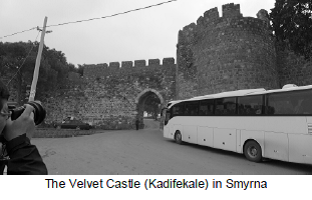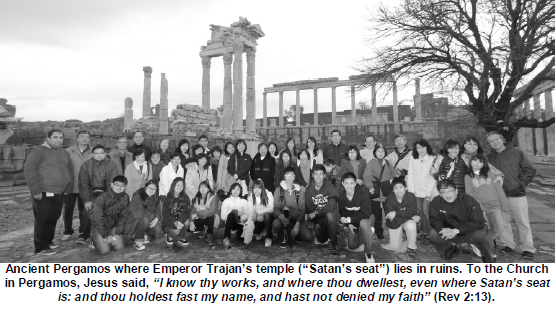A CHURCH FAITHFUL UNTO DEATH
Dn Leong Kwok Whye

I would like to share with you the lesson I learned on 17 December 2012 during a visit to the ramparts of Smyrna’s Velvet Castle which was built on Mount Pagus in the fourth century BC by Alexander the Great.
Smyrna and Emperor Worship
Smyrna’s modern name is Izmir. Izmir is the third most populous city in Turkey with a population of three million (as of 2011 according to the Turkish Statistical Institute), and is Turkey’s major port on the Aegean Sea. The modern city of Izmir is built on the ancient site, and so very little excavation is possible (Faith Cimok, A Guide to the Seven Churches, p54).
Ancient Smyrna was destroyed by an earthquake in 178 AD. There is nothing left from the Hellenistic city and from the Roman period; only the ruins of the Agora survive. Smyrna is located at the terminus of inland trade routes that followed the Hermus (Gediz) and Maeander valleys out of the east. From its sheltered harbour in the southern Aegean Sea, trade made its way west to the Greek mainland. A Greek colony dominated the area as early as the 10th century BC, claiming to be the birthplace of Homer. In the Roman era, the city was invited to be one of the custodians for the temple of Emperor Augustus.
In New Testament times, Smyrna was an important commercial city. In spite of the keen competition from the neighbouring cities of Ephesus and Pergamos, Smyrna called itself “the first city of Asia” (David Noel Freeman, Eerdmans Dictionary of the Bible, p1233). In 195 BC, Smyrna foresaw the rising power of Rome and built a temple for pagan Roman worship. In 23 BC, Smyrna was given the honour of building a temple for Caesar because of its years of faithfulness to Rome. Thus the city became a centre for the cult of emperor worship which resulted in the severe persecution of the early church in the days of Nero and Domitian (Ronald F Youngblood, Nelson’s New Illustrated Bible Dictionary, p1187).
Persecution of Church in Smyrna
Jesus said to the Church in Smyrna, “I know thy works, and tribulation, and poverty, (but thou art rich) and I know the blasphemy of them which say they are Jews, and are not, but are the synagogue of Satan.” (Rev 2:9). The Romans and the Jews persecuted the Christians in Smyrna because:
(1) The true worship of Christ would replace the cult worship of the Roman emperor for which Smyrna was well known. The faithful Christians were regarded as disloyal for their refusal to bow to Caesar’s idol. They were charged with treason for not worshipping the emperor.
(2) The faithful Christians refused to worship the pantheon of gods. This incensed the idol worshippers of Smyrna. In addition, the Christian worship of the Invisible God also gave rise to the false charge that these staunch Christians were “atheists” as they did not worship any god that could be “seen”. The Christians were regarded as anti-social elements in their society.
(3) The unbelieving Jews falsely charged the Christians for cannibalism because of the Lord’s Supper. Christians were accused of eating the flesh and drinking the blood of Jesus Christ. The Lord called this group of hostile Jews in Smyrna, “the synagogue of Satan”.
Due to the religious and political persecution, the faithful Christians in Smyrna were poor and condemned, although the city itself was wealthy because of trade.
Polycarp: Bishop of Smyrna
Nevertheless, God gave much grace to this materially poor church, and blessed them with a faithful witness in Polycarp who was Bishop of Smyrna (AD 69-155). Polycarp was one of the last pupils of the Apostle John. Polycarp would have learned much doctrine from John. He would have read the letter to Smyrna and the contents of the book of Revelation. Thus Polycarp was firmly grounded in the Word of God and His faith in Christ was steadfast and unmovable.
In addition, the Apostle Paul, during his three-year missionary work at Ephesus, probably visited and taught in Smyrna as it was near Ephesus (Acts 19:10). The church in Smyrna would have learned profound spiritual lessons directly from the Apostle Paul as he also wrote deep theological truths in his epistles.
Martyrdom of Polycarp
The Roman proconsul of Smyrna must have reasoned, “Kill the church leader and his church will die.” Soldiers were thus dispatched to arrest Polycarp. When the soldiers arrived at the farmhouse where he was residing, they marvelled at his old age and constancy. Polycarp promptly ordered food and water for the hungry soldiers. He asked them to give him an hour so that he might pray undisturbed. When they consented, he stood and prayed for two hours. On the way to the city, the soldiers tried to persuade him, “What harm is there to say ‘Lord Caesar’ and to offer a pinch of incense and save yourself?” Polycarp was not persuaded.
In the stadium, the proconsul told Polycarp to swear by the fortune of Caesar, and say, “Away with the atheists!” Polycarp, instead, raised his hand and turned towards the crowd in the arena and said, “Away with the atheists!” The crowd went berserk. The faithful bishop then spoke firmly to the shaken proconsul, “Fourscore and six years have I served Christ, and he has never done me injury; how then can I now blaspheme my King and Saviour?”
When Polycarp rejected further pressures to deny Christ, the proconsul threatened to burn him. Polycarp turned the tables on the proconsul and warned him of eternal fire. The proconsul ignored the warning and ordered the execution to proceed. When the soldiers prepared to nail Polycarp to the stake, he assured them nails would not be needed. He promised them he would not flee from the flames. Polycarp was totally prepared to be faithful unto death. He understood Revelation 2:10 well and was keen to receive the crown of life after his final testimony before the astonished proconsul and the enraged crowd. As the fire was lit, Polycarp feared none of those things which he had to suffer because his heart was already full of Christ and his mind was firmly set on the New Jerusalem where he shall be with Christ for eternity.
Did the hateful flames of Rome incinerate such victorious (nike) faith in the Lord Jesus Christ? No, certainly not! Bishop Polycarp’s faith remained a conquering faith, loyal to Christ who is True God and Resurrected Saviour. Polycarp died in AD 155 to receive the crown of life from the Lord Jesus Christ who is the First and the Last, who was dead, and is alive. Jesus promised His saints in Revelation 2:10-11, “be thou faithful unto death, and I will give thee a crown of life. He that hath an ear, let him hear what the Spirit saith unto the churches; He that overcometh shall not be hurt of the second death.” (cf Rev 20:14-15).
I thank God for giving me the privilege to learn this spiritual lesson at Smyrna. Amen.

LETTERS FROM OVERSEAS
Collingswood, USA
Thank you so much for the complimentary copy of To Magnify His Word which came to me in the mail this morning. I have spent a good deal of time reading through it today and marvel at the grace of God manifested through the life of Dr. Timothy Tow and the Far Eastern Bible College over the past 50 years. The school is also a testimony of the grace of God in times of conflict and trial.
The book is an excellent summary of FEBC and its history—and spiritual impact. I praise God with you that FEBC remains faithful to fundamentalism and the original Hebrew, Aramaic and Greek texts underlying the KJV. I was glad to read the congratulatory (and warning) note by Dr. D.A. Waite who is a close friend with whom I have fellowship often. I was also glad that FEBC takes a strong stand for creation and a young earth as noted by Dr. John C. Whitcomb.
Thank you again for the book. It is a valuable addition to my library.
Looking for the Blessed Hope,
Pastor Christian S. Spencer
Bible Presbyterian Church of
Collingswood
October 16, 2012
[Ed: The Rev Christian Spencer succeeded Dr Carl McIntire as pastor of the historic Bible Presbyterian Church in Collingswood, and is an advisory council member of the Dean Burgon Society. We appreciate his encouraging words and hope for greater fellowship with him in days to come.]
Kobe, Japan
Greetings in the Lord Jesus Christ.
Thank you for your prayer and thank you for your church weekly.
I thank God that He guided me this year also, and He gave me healthy body so I could hand tracts to Japanese children. Maybe this year is the last. Happily I handed out almost all already. And I become 80 years old next year.
I can walk mountains twice a week today. And I go up and down the steps 50 times a day. I don’t go to doctor nor take medicine.
God bless you richly next year.
In the Lord,
Setsuko Takashima
December 1, 2012
[Ed: Setsuko graduated from FEBC with a DipTh in 1984, and has served the Lord faithfully all these years as an evangelist especially to children by “kamishibai” (telling stories by “paper-graph”), giving out tracts, and wearing a Gospel t-shirt with a Bible verse printed at the back. May the Lord continue to bless our beloved sister in Japan who is a humble servant of the Lord and a precious daughter of FEBC.]


